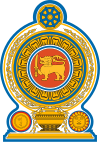Speaker of the Parliament of Ceylon
| Speaker of the Parliament of Sri Lanka පාර්ලිමේන්තු කථානායක |
|
|---|---|

|
|
| Style | Honourable Speaker |
| Residence | The Speaker's Residence, Sri Jayawardenapura Kotte |
| Appointer | Parliament of Sri Lanka |
| Constituting instrument | Constitution of the Democratic Socialist Republic of Sri Lanka |
| Inaugural holder | Alfred Francis Molamure |
| Formation | 7 July 1931 (as Speaker of the State Council of Ceylon) |
| Succession | Second in the presidential line of succession |
| Deputy | Deputy Speaker of the Parliament |
| Salary | LKR 822,000 annually (2016) |
| Website | www |
The Speaker of the Parliament of the Democratic Socialist Republic of Sri Lanka is the presiding officer of the chamber. The current Speaker of the Parliament is Karu Jayasuriya, in office since 1 September 2015. The Speaker fulfills a number of important functions in relation to the operation the House, which is based upon the British Westminster Parliamentary system.
The Speaker is second in the Sri Lankan presidential line of succession, after the Prime Minister.
In 1931 under the Donoughmore Constitution the State Council of Ceylon was established and in it the first office of a Speaker of a legislative body was created as the Speaker of State Council.
In 1947, according to the recommendations of the Soulbury Commission the State Council was dissolved and a Parliament was established in the Westminster model with an upper house, the Senate and the House of Representatives. While the head of the President of the Senate became the head of the Senate, the Speaker of the House of Representatives became the presiding officer of the House of Representatives. The office of the Speaker, as it exists now, was established in 1947, with the opening of the First Parliament of Ceylon on February 4, 1948 granting of independence and the establishment of the Dominion of Ceylon.
The Speaker presides over the House's debates, determining which members may speak. The Speaker is also responsible for maintaining order during debate, and may punish members who break the rules of the House. The Speaker remains strictly non-partisan, and renounces all affiliation with his or her former political party when taking office for the duration of his term. The Speaker does not take part in debate or vote (except to break ties). Apart from duties relating to presiding over the House, the Speaker also performs administrative and procedural functions, and remains a constituency Member of Parliament (MP). The Speaker would be a chairmen of the constitutional council. The Speaker may accept the resignation of the President. The Chief Justice in consultation with the Speaker may determine that the President is temporarily unable to exercise, perform and discharge the powers, duties and functions and appoint the Prime Minister as acting President.
...
Wikipedia

